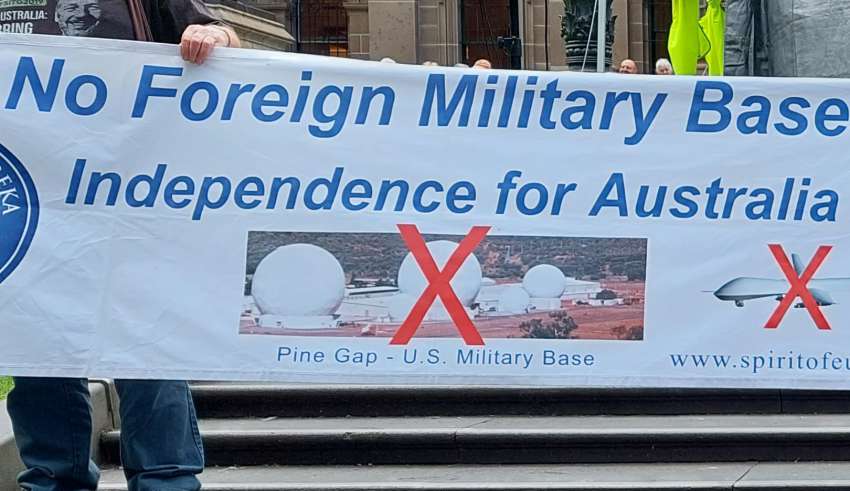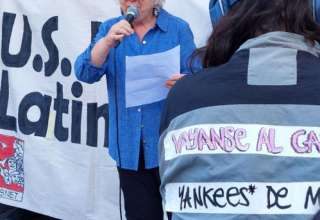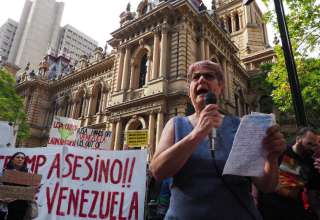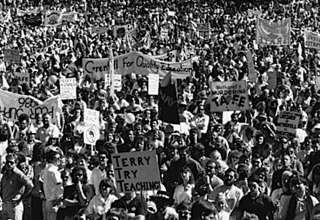By Brian Boyd, July 2023
This is the third of a three part-series that examines the strategic reasons for the AUKUS pact and the dangers for Australia.
REAL NATIONAL SOVEREIGNTY
While Prime Minister Albanese, Foreign Minister Wong and Defence Minister Marles have gone to great pains to insist that Australia’s ‘national sovereignty’ will govern the operations of the future nuclear powered submarines, the AUKUS framework actually assures the submarines will be incorporated into the US combat force operational posture. Defence Minister Marles has confirmed as much in TV interviews.
Preserving genuine Australian sovereignty by the Australian government is a crucial question for ongoing public debate. At the very least Australians have a right to insist that parliamentary authorisation for any military deployments should be a constitutional requirement.
Australia is entitled to possess an effective Australian Defence Force, as are all nations. But does the implementation of AUKUS give us such truly sovereign protection?
Nuclear-powered submarines are designed for long-range operations, it could be argued that they are ideal for defending Australia’s long coastline. However, if the US required our submarines to operate thousands of miles away, what would be the government’s answer? How would such an operation make Australia safer?
Further, there has been no explanation given, to date, about why we are moving from a strategic position of defending the Australian mainland to a forward defence position, relying on a handful of mostly second-hand nuclear-powered submarines.
THE KEATING INTERVENTION
A threshold test in understanding our strategic position, as the 21st-century unfolds, is the question of “sovereignty”.
Former Prime Minister Paul Keating’s intervention in the public debate was actually unhelpful, in part. By describing China’s exponential, economic growth and global intentions as “benign” and making personal, derogatory comments about government ministers and certain journalists, became a distraction from what really needed to be debated.
That is, Keating could have argued that it is incumbent on the federal government, its agencies, media commentators and various well-funded think tanks to provide the Australian public with hard evidence, facts and proof that Australia is facing real threats to its integrity as a continent and as a sovereign nation.
Keating could have also educated the Australian public on how the US dealt with Australia during his time as part of previous ALP governments. Bob Hawke was well known as a pro-US alliance servant. He opened up northern airfields in the 1980s to the first B-52 bombers to visit Australia.
The US also enhanced its operations at its secret bases on Australian soil, such as Pine Gap and North West Cape, under Hawke. US Congressman Joe Courtney, when recently speaking about the AUKUS pact, openly linked his support for it, specifically to the secret Pine Gap facility as a crucial illustration of the ties between Australia and the US.
Keating was around in the 1980s when, under the Hawke administration, Defence Minister Kim Beazley was given the task to renegotiate the secret Pine Gap agreement. Beazley had trouble in trying to get the US to concede in practice, that Pine Gap was “a joint facility”. Beazley also went to the facility near Alice Springs and, even though he was an elected Australian Member of Parliament and a Minister, he couldn’t see everything he needed to see!
In a similar vein Keating could have also talked about the difficulties another Hawke Minister, Gareth Evans, had in dealing with the US during the first Gulf War in 1991. Evans tried to have Washington consult with Australia over how some of Australia’s military personnel were to be assigned, especially when it came to some ‘particularly vulnerable locations’. US Secretary of State, James Baker, speaking to Evans by phone told the Australian MP- “We’re running the fucking war”.
In September 2001, after the airliner terrorist attacks in the US, the Howard government, under US direction, sent all of our long-range fighter bomber fleet (F111’s) to the US base on Diego Garcia in the middle of the Indian Ocean, to assist the US military response. This of course left Australia without any air cover.
And in October 2002, then US Vice President Dick Cheney told an Australian official that Australian submarines were used by the US to “provide intelligence”, on the Soviet Navy during the Cold War. Likewise back in 1973, the CIA used Australia’s overseas spy organisation ASIS to assist in the overthrow of the elected lend a government via a coup in Chile.
So much for respecting Australian sovereignty.
One pro-US war hawk in the Australian media tried to describe Paul Keating as our “local cheerleader” for China. Similarly Foreign Minister Wong implied some critics want Australia to “attach ourselves” to China. These are desperate mischaracterisations of Keating’s and others positions. Keating has never suggested that our foreign policy switch from the US to China. The whole thrust of his recent commentary is all about arguing for a more independent, self- respecting, sovereign positioning of our country in the world.
Further, Keating argues that Australia should rightly make the thrust of our defence preparations for any hostile military operations that could impact on our continent. A proposition that most Australians would support.
Given the opponents of Keating’s position accept it is unlikely that China will mount any military incursion against Australia, the government’s rationale for further enhancing our military posture within the US global military machine, needs to be fully spelt out and questioned.
It is understood that future challenges may come about, via coercive trade measures, political interference, dis-information, ignoring or reshaping international trade rules and spreading unfair mercantile business ventures. Such activities, by any nation, in its dealings with Australia should be taken seriously and acted upon.
But does such practices justify going to war, as argued by many of the pro-war hawks in Canberra?
PLAYING GAMES
The Australian government is currently playing games with the Australian public’s right to know, by neither confirming nor denying that visiting US warships, submarines and air force bombers could be carrying nuclear weapons. This question alone undermines the government’s credibility about claiming it is protecting Australia’s national sovereignty. It ignores Australia’s long-standing core policy of opposition to nuclear proliferation via the South Pacific Nuclear Free Zone treaty.
On her diplomatic trips through the Pacific Foreign Minister Wong insists Australia future nuclear powered submarines, under AUKUS, “would not hinder” Australia in its commitment to the ‘nuclear free zone’. But this is disingenuous. The Australian government is already in breach of this important treaty by allowing US military assets, armed with nuclear weapons, to use Australian military bases. The US has informed the Australian government it is not obliged to “confirm or deny” the status of its munitions on any of its visiting military assets.
At the NATO Summit in the second week of July this year, the Australian Prime Minister Albanese again emphasised Australia’s position is believing “in the rule of law” and “the international rules-based order”. Just prior to that summit the US announced it was going to provide cluster bombs to Ukraine. Australia and Britain are signatories to the Convention on Cluster Munitions (CCM) that bans the production and use of such weapons. While hosting the US President in London, prior to the NATO meeting, the British Prime Minister “offered only token criticism” regarding the US cluster bomb decision, only because he was obliged to under the international convention. The CCM is a product of the ‘international rule of law’.
Is the Australian government currently and going forward applying a similar “token” approach to what arms US military assets are carrying in and out of Australia?
Some right-wing commentators are confecting a false concept of national sovereignty.
They claim that conceding our military capability to another power does not deserve to be questioned. Some blithely state it is not an important question, in the current global circumstances. One commentator even suggested “the government needs to end the silly debate about sovereignty”, adding, if we insist on “total sovereign control over our security we will end up looking undefended like New Zealand…”.
Another commentator, who had been regularly praising Defence Minister Marles, eventually chastised him for daring to narrow the strategic justification for the nuclear powered submarines “a bit too much”, by just talking about protecting Australia’s “sea lanes and trade routes”, instead of emphasising the wider campaign against China!
Doublespeak is becoming more common across the board. Back in early April Federal Home Affairs Minister Clare O’Neil ‘warned that Australians are entering a post- peace period of high tension, as the world faces the most complex geo-strategic challenges since World War II’-“a world of precarious global dynamics… will reshape life in our region”. These non-specific, sweeping statements were the basis of why, she said, the federal government ‘needs to bolster its domestic security in response’.
Yet in the same speech Minister O’Neil went to great pains to insist she was ‘seeking to reassure people there was no prospect of war or conflict being imminent’-“let me be very clear: Australia is not at war, nor are we about to be at war”.
THE RIGHT TO QUESTION-SMEARING CONTRARY VIEWS
Persistently the “China threat” is presented as a given and never questioned.
Some of the advocates for AUKUS acknowledge that the economic growth of China requires vigilance. This is a reasonable proposition in itself. The Australian government should always be monitoring any challenges, especially adverse ones, to our trade and commerce with any nation, including China. But does economic, mercantile competition, justify persistent talk of war as a response?
Anyone who questions the necessity to go to war, especially for Australia to join the US in a war with China, are now being adversely labelled by a number of right-wing commentators. Terms such as “naysayers”, “out-of-date”, “well-funded China lobby”, “professional anti-Americans”, “defeatists” and “puppeteers” are already being bandied around. Those commentators slandering people are, so far, being selective.
Back in March the head of ASIO, in his annual ‘threat report’ said Australia was experiencing foreign interference, at even a bigger level than what occurred during the so-called Cold War period.
Of concern was that the ASIO chief even dared to suggest that anyone who was putting forward contrary views to ‘taking on China’, should be considered as “lackeys”, “toadies” or worse. He singled out business people, academics, public servants and activists, for daring to argue that the case for open conflict against China, had yet to be made. ASIO was clearly parroting the arch-right, pro-US war narrative and jingoism of the Australian Strategic Policy Institute (ASPI), the Murdoch press and the small cabal of certain armchair ‘experts’.
Regardless, the ASIO head didn’t provide any details or evidence to the public against his unnamed, fellow Australians. No mention at all either of the lack of convictions and charges laid under the draconian National Security (espionage and foreign interference) Act of 2018, a law written by the security agency itself.
Contrast this approach with the comments from the retiring ASIS director at the end of 2022 on ABC radio (4/11/22) when asked to comment on the current “major power conflict”, he argued there should be more “de-classifying of intelligence” for the public to be made aware of. He added, the Australian government will act in the “national interest…[and]… there shouldn’t be any automatic assumption that Australia would join the US in any conflict with China over Taiwan”.
Simply, the right wing pro-war elements and their supporting sections in the media have no monopoly on what is patriotic and what is genuine sovereignty. Ordinary Australians are entitled to be opposed to war and argue that it’s government to take all necessary steps to prevent war.
Recently, former Victorian Liberal party Premier Jeff Kennett said: “I do not believe China is a genuine military threat to Australia”. He, like many Australians, does not oppose Australia strengthening and upgrading its military defences, but that didn’t mean we shouldn’t seek “to secure a good working relationship with China which could secure Australia for future generations”. Surprisingly none of the right wing think tanks have gone after Mr Kennett.
During the first half of 2023 there were also a number of reports that there was growing disquiet within the Australian Labor Party membership base about the Albanese government’s AUKUS undertakings.
The Prime Minister did respond at one point: “there are people who have different views in the Labor Party. They are entitled to put them forward.” However the Prime Minister is not defending this right when the pro-war hawks demand that they be silenced and be deemed “un-Australian”.
It is becoming necessary for these pro-war advocates to be called out as the real ‘agents of influence’ of a foreign power. As the necessary public discourse evolves, more needs to be done to expose these reactionary voices.
IS THERE MORE TO KNOW?
Does the federal government know more than it is letting on?
It is one thing the US desires to protect its economic world order it has constructed since World War II and preserve its sphere of influence, by containing China’s activities to economically expand its own sphere of influence. It is quite another thing that this competition, should turn into a “hot war” which will put Australia in the thick of it.
At the AUKUS launch Prime Minister Albanese put more emphasis on the huge defence spending proposals enhancing the government’s manufacturing strategy and creating thousands of jobs. Nothing about deterring threats.
Prime Minister Albanese unabashed, wrote after the AUKUS submarine announcement: “This will be an Australian sovereign capability-built by Australians commanded by the Australian Navy and sustained by Australian workers in Australian shipyards…[the]… Agreement also unlocks a set of transformative opportunities for jobs, skills, research and innovation… These will be good jobs paying good wages, ensuring the stability and prosperity of our nation, our region and our world”. The fact is Mr Albanese will be long retired from the Australian Parliament before even one of these AUKUS jobs eventuates, if at all.
Of no help to the federal government was that shortly after the proposed acquisition of nuclear powered submarines announcement, a leading US defence procurement expert, who had worked for the George W Bush administration, said the chances of the nuclear power submarines arriving on time, could see them obsolete by the 2040s.
The US expert went on to say that the US had “chronic industrial bottlenecks” at its shipyards for at least another 5 to 6 years. He also emphasised that one of the greatest, current worries of the U.S. Navy was that the surveillance and sensor technology in space and in the oceans, currently in the possession of potential adversaries, were already undermining submarine capabilities!
Ironically, after the AUKUS “contrived media event” in the US, The Age newspaper editorial (16 March 2023) described the so-called “moonshot” of the government’s nuclear powered submarine announcement as possibly a “longshot”. The paper went on to query whether Australia was up to the challenge of requiring “a giant technological leap forward and …[the need to]… draw on the resources of an entire nation”. The Age gave “cautious support” to the submarine deal. However the newspaper questioned why the government was yet to provide details, describing them so far, as “sketchy”.
In particular, concerning the offer of Australia receiving already operational Virginia-class boats, The Age noted- apparently the deal was “yet to be locked down in terms of exactly how many we’ll get, how old they are likely to be and what their capabilities are”.
The Age also entered into the ‘sovereignty’ debate: “Indeed, the government has been less than upfront about the potential outlay and, critically, the many factors that may lead to a bigger bill than we have been led to expect…Here, sovereignty is critical: these must be Australian submarines, run by Australian crew, following Australian rules. Any blurring of the lines carries unacceptable risks”.
Somewhat ironic, as The Age in the preceding weeks had run a series of articles under the title: ‘Red Alert’, which had pro—US war hawk commentators predicting, amongst other things, that war with China was on the cards within three years! The Age gave these commentators, a platform to sell a pro-war, set-the-agenda narrative in the lead up to the AUKUS nuclear powered submarine announcement.
Yet compare these ‘drums of war’ commentaries to a report from Washington in The Age the following week: “The US intelligence community assesses that China doesn’t want military conflict over Taiwan, even as it is determined to bring the independently governed Island under its control”, officials told a US House of Representatives hearing (10/3/23).
“It’s not our assessment that China wants to go to war”, the director of national intelligence told the US House Intelligence Committee as part of an annual briefing on world- wide threats faced by the US.
The writers of the so-called ‘Red Alert’ articles provided no response to the story.
Again, is there more to know? Defence Minister Richard Marles in an interview for 60 Minutes, Channel 9 (21/5/23), said that Australia is facing “a threatening environment now… no time to waste”. When he was asked by the interviewer: “How much time do we have?”-Minister Marles didn’t want to answer.
By the following week Marles was telling a ‘Defending Australia’ conference that Australia’s defence spending would grow over the “next 10 years”, while adding that China remained “at the heart of our economic growth”.
Further, he said that during the previous Morrison/Dutton government “gratuitous and inflammatory comments” were made about China for the sake of “short-term electoral interest” and ‘without regard for the interests of the Australian people!‘. Marles went on to praise China for also lifting itself ‘out of poverty’.
Around the same time a new mantra about China seemed to evolve. There was a new “buzzword” coming from global leaders in Europe and the US.
All they now needed to do was “de-risk” their relationship with the world’s second biggest economy, rather than “decouple”. Decoupling apparently had become obsolete as an idea. It was considered “a scary term and particularly a scary term for the business community”!
“The US-China divide has stoked broader economic concerns among governments as companies seek to diversify supply chains to avoid being caught in the geopolitical competition…”
No explanations at all from the Australian Federal government to the Australian public about what all these changing nuances mean.
PM A CONFLICTED LEADER
When speaking to the AUKUS agreement Prime Minister Albanese said in part: “For more than a century brave citizens from Australia, the US and Britain have been part of a shared tradition of service in the cause of peace, and sacrifice in the name of freedom”.
This is gilding the lily to an offensive level. Putting aside the necessary six-year efforts of World War II (1939 and 1945) to defeat the fascist aggression of the Axis powers-Germany, Japan and Italy, essentially all of the other conflicts for the last hundred years were not about such lofty goals as “peace” and “freedom”.
World War I was basically about the great powers of the time carving out their colonial empires. Subsequently many conflicts in Africa, Asia and South America were about suppressing anticolonial and pro-national independence movements. By way of illustration, the Vietnam War, the military coups in Indonesia and Chile and the invasion of Iraq, were based on lies and Mr Albanese protested against such wars himself! PM Albanese is bending the knee too much, with such a sweeping, embarrassing and gratuitous statement.
In a similar vein, Foreign Minister Wong recently claimed that the US ‘continues to play an indispensable role in promoting peace and security in the Asia-Pacific region’, ‘provided a long, uninterrupted period of stability’ and therefore didn’t deserve those taking “pot shots at America’s imperfections”. Imperfections must be code for numerous wars, coups and installations of dictators in many parts of the world!
The federal government well knows that the real agenda behind the AUKUS agreement is to further enhance the US military footprint on Australian soil. We already have thousands of US soldiers passing through the Top End, we are enhancing the Australian Tindal airbase to accommodate US nuclear armed B-52 and B-2 bombers and are opening up our ports to even more visits by nuclear armed US submarines and warships. There is also much speculation about stationing US long-range missile facilities in Australia in the near future.
SUMMARY
A vocal, broad-based anti-war/peace movement is needed in Australia.
In that broader campaign for peace, Australians are entitled to demand from the government a genuine, truly independent foreign policy, underpinned by a defence capability, which is based on national sovereignty principles. The central task of these principles is to protect our island continent from external, military aggression. This approach requires no subservience to any foreign power and no more participation in their foreign war zones.
Yet the only measurable result of the AUKUS arrangement is that Australians are witnessing “the greater integration of US and Australian forces in war planning”. This, by definition, means less independence Australia has in relation to participation in any future US military operations. This should trouble every Australian.
The language and broad narrative about just what strategic threat Australia actually faces, is always non-specific. No detailed analysis of the claimed changing strategic circumstances facing our country is ever spelt out. There is a vacuum in public awareness.
There are admissions that a direct Chinese attack on Australia is not in the foreseeable future.
Therefore it is fair to conclude that the basis of Australia’s defence planning is all about another agenda.
This has led to more discussion of what defines Australia’s real sovereignty and national interests per se. More voices are being raised concerning the US alliance and its AUKUS and QUAD add ons, being further evidence of Australian subservience. In response, there is a growing push for a more independent military capability to defend Australia, taking the path of the concept of “armed neutrality” and full “sovereign control” of our own independent defence industry.
This is not a pro-China agenda. It is a pro-Australian, with self-respect agenda.
But this stance is being mocked by the pro-US war hawks out of Canberra.
These voices desperately attacked the recent views of the French president Macron, when he suggested that the EU, in the current period of great power rivalry, should take a more autonomous strategic position, especially within the growing economic tensions between the US and China: “We don’t want to get into a bloc versus bloc logic … [Europe] should not be caught up in a disordering of the world and crises that are not ours”.
Recently The Philippines opened up more military bases for the US and carried out large joint military exercises with American forces. However The Philippines government had no qualms about adding riders to the updated arrangements with America.
“Both sides are conscious that the alliance must deliver, must also transform to be more firm as it is to fit the 21st-century realities… as responsible powers [the US and China]… also need to manage their strategic rivalry”.
The Philippines President told his South East Asian nation neighbours that all military capabilities within The Philippines would not be used in “offensive action… If no one is attacking us, they need not worry because we will not fight them”. He added that “we would not allow The Philippines to be used as a staging post for any kind of military action”.
If The Philippines can require that all military forces on its soil will only be used to defend the country only when under attack, then why can’t the Australian government, at the very least, require the same undertaking?
In a similar vein, during a visit to Australia in early July, Indonesian President Widodo called on Australian Prime Minister Albanese to take “concrete action” to maintain peace in the Indo-Pacific, in order to push back against escalating US-China tensions. He called on Australia to join with other countries not to contain China but to emphasise maintaining stability in the “very strategic” region.
One commentator, John McCarthy (a former Australian diplomat), said on the lead up to the Widodo visit (3/7/23) that “Indonesia could help bring China and the US back from the brink”. Similarly two academics (Peter Drysdale and Rizal Sukma) wrote that “small and middle powers such as Australia and Indonesia have the incentive to articulate together an alternative to the zero-sum logic of great-power geopolitical competition”. They added: “Renewed commitment to an open, pluralistic and co-operative regional order will reinforce regional political stability and economic prosperity”.
Other commentators however, have been taking a different approach.
After the DSR was announced a media commentator offered up the following:
“Yet a simple reading [of the DSR] makes the implications of the strategy clear: Australia is offering to change its strategic and defence role to become even more absorbed into the US Armed Forces.
“The army will be reshaped as [an] auxiliary of the US Marines and a defender to some extent of US bases in northern Australia. The navy “platforms” will be restructured to fit US navy doctrines. Not much has been mention of the air force, but it too will become more part of the US war fighting machine… the march towards this tightening US embrace began with John Howard, was continued by Kevin Rudd and Julia Gillard, wound tighter by Scott Morrison and has now been reinforced by the Albanese Labor government”.
The commentator went on to report that Mike Green the CEO of the US Study Centre and a former US national security council director for President George W Bush, gave approval to the “credibility and clarity” of the DSR, adding it was “basically what the Pentagon would want to see”.
More bluntly, under the heading: ‘Bigger role in US war planning puts bigger target on us’, (27/6/23), Sam Roggeveen of the Lowy Institute put forward the following:
He first reported on the hosting of existing US military assets on Australian soil-for example the Pine Gap military communications facility outside Alice Springs, the North West Cape facility in Western Australia, the US Marine Corps training facility in Darwin. Roggeveen then outlined that the Australian Navy base, HMAS Stirling in Perth, will expand its hosting of US submarines and other warships, that the RAAF airbase at Tindal in the NT will be upgraded to have “a wartime mission”.
“This is a major shift in Australian policy. Australia is becoming integral to US war planning, which means the enemy will have a strong incentive to hit those bases. Whether Australia commits its own military forces to our US-China war or not, Australia will almost certainly be a target”.
Australia occupies a continent. We are a major economy and we are located in the fulcrum of global competition between two superpowers.
Australia has the potential to have a positive influence in shaping global events, yet that ability is hindered because we have no real independence or self- respect. Over the decades we have suffered from a “cultural cringe” in terms of dealing with the US. In one area alone there is a persistence that Australia is always obliged to follow the US into any of its military follies. To date we cannot characterise the US-Australia relationship as relationship of equals. Our strategic posture is undermined by a bevy of pro-US war hawk ,’agents of influence’, based in Canberra.
We should not always be held hostage by events dictated by the US. Our own national interests should be defined by a genuine, independent sovereignty.
Recently one right wing commentator actually posed the question that supporters of a genuine Australian sovereignty approach might end up compromising any future Australian government making decisions about military operations, especially required by the US.
That’s how compromised the thinking of the ‘armchair’ security industry in Canberra and the majority of press commentators has sunk in 2023. These “faceless” operatives are already generating a narrative to have anyone who dares question where Australia’s foreign policy is heading, charged with ‘heresy’ and ‘disloyalty’!
The anti-war movement needs a logical narrative that provides viable, testable evidence that explains the dynamics of the evolving contested world order. It is essential to counter the repetitive, simplistic pro-war narrative, using mis-information and distortion to promote and justify war preparations.
The fight for peace has just begun.







